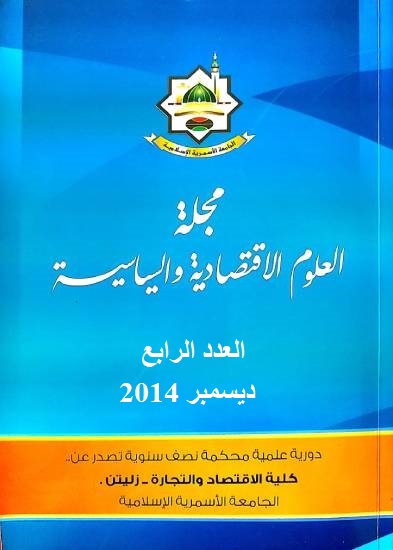الوضع القانوني والمالي للشركات العميلة محل المراجعة وأثره على استقلالية المراجع الخارجي
Abstract
يهدف هذا البحث إلى دراسة أثر الوضعية القانونية، والمالية للشركات العميلة محل المراجعة على استقلالية المراجع الخارجي من وجهة نظر أحد مستخدمي القوائم المالية في ليبيا (مدراء الائتمان بالمصارف). ولأجل الوصول إلى تحقيق هذا الهدف، قسم البحث إلى أربعة أجزاء رئيسية، حيث عرف في الجزء الأول بمشكلة البحث وهدفه وأهميته، في حين خصص الجزء الثاني لبناء الإطار النظري للبحث، أما الجزء الثالث فقد كرس لعرض الجوانب المتعلقة بالدراسة الميدانية، وأخيرا تناول الجزء الرابع عرضًا لأهم النتائج التي تم الوصول إليها، بالإضافة إلى تقديم بعض التوصيات المقترحة. وقد أظهرت النتائج المتحصل عليها من خلال تحليل البيانات تأثر استقلالية المراجع الخارجي بشكل كبير في حالة انتماء الشركة العميلة محل المراجعة إلى شركات القطاع الخاص والهادفة إلى تحقيق الربح ، أو إلى الشركات التي تعود ملكيتها للقطاع العام والخاص والهادفة إلى تحقيق الربح، أو إلى الشركات التي تتمتع بحالة مالية جيدة، أو ذات الحجم الكبيرة.
References
- Abdul Nasser, A. Wahid, E. Nazris, N. F. S. M. and Hudaib, M. (2006), “Auditor- client relationships: the case of audit tenure and auditor switching in Malaysia”, Managerial Auditing Journal, Vol. 21, No. 7, pp. 724-737.
- Alleyne, P, A. Devonish, D. and Alleyne, P. (2006), “Perceptions of auditor independence in Barbados”, Managerial Auditing Journal, Vol. 21 No. 6, pp. 621-635.
- Almalhuf, B. A. (2009), “Perceptions of Libyan external auditor independence”, Unpublished PhD Dissertation, Liverpool John Moors University, UK.
- Beattie, V. Brandt, R. and Fearnley, S. (1999), “Perceptions of auditor independence: UK. Evidence”, Journal of International Accounting, Auditing & Taxation, 8 (1): 57-107.
- Francis, J. and Wilson, E. R. (1988), “Auditor changes: a joint test of theories relating to agency costs and auditor differentiation”, The Accounting Review, Vol. 63, pp. 663-82.
- Gorman, F. B. and Ansong, G. (1998), “Perceptions of independence- Do they change over time?”, International Journal of Auditing, Vol. 2, pp. 185-196.
- Gul, F. A. (1989), “Bankers’ perception of factors affecting auditor independence”, Accounting, Auditing & Accountability Journal, Vol. 2, No. 3, pp. 40-51.
- Gul, F. A. and Tsui, J. (1992), “An empirical analysis of Hong Kong banker’s perceptions of auditor ability to resist management pressure in a conflict situation”, Journal of International Accounting Auditing & Taxation, Vol.1, No. 1, pp.177-190.
- Hudaib, M. and Cook, T. E. (2005), “The impact of managing director changes and financial distress on audit qualification and auditor switching”, Journal of Business Finance and Accounting, Vol. 32, No. 9/10, pp. 1703-1739.
- Knapp, M. (1985), “Audit conflict: an empirical study of perceived ability of auditors to resist management pressure”, the Accounting Review, Vol. LX. No. 2, pp. 202-211.
- Pallant, J. (2007), “SPSS survival manual”, Open University Press, Buckingham.
- Sarantakos, A. (1998), Social research”, second edition, MaCmillan Press, London.
- Sekaran, U. (2003), “Research methods for business”, Fourth Edition, John Wiley & Songs, Inc.
- Sucher, P. and Bychkova, S. (2001), “Auditor independence in economies in transition: a study of Russia”, the European Accounting Review, Vol. 10, No. 4, pp. 817-841.
- Umar, A. and Anandarajan, A. (2004), “ Dimensions of pressure faced by auditors and its impact on auditors’ independence: a comparative study of the USA and Australia “ , Managerial Auditing Journal , Vol. 19 No. 1, pp. 99-116.
- Watts, R. L. and Zimmerman, J. L. (1986), “Positive accounting theory”, Prentice-Hall, Englewood Cliffs. NJ.
Downloads
Published
How to Cite
Issue
Section
License
Copyright (c) 2014 Journal of Economic and Political Sciences

This work is licensed under a Creative Commons Attribution 4.0 International License.





